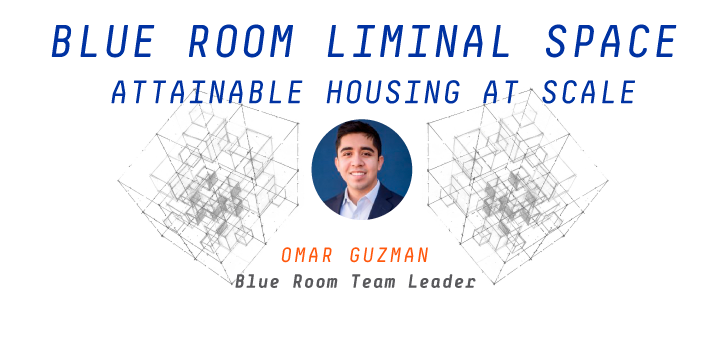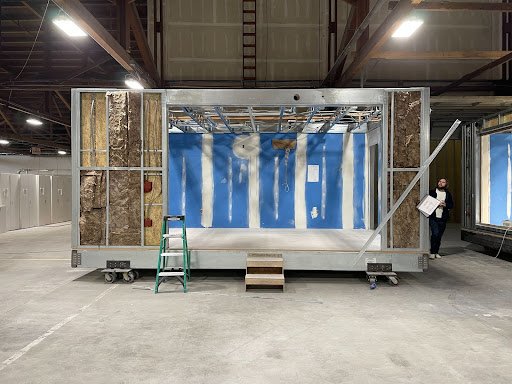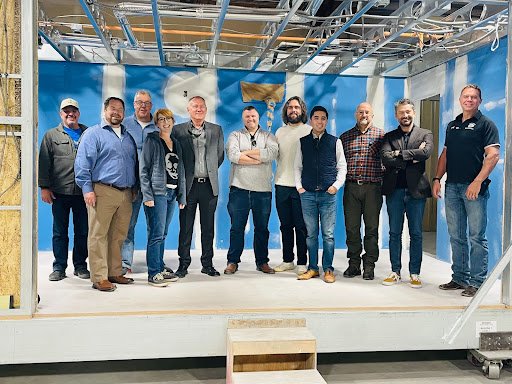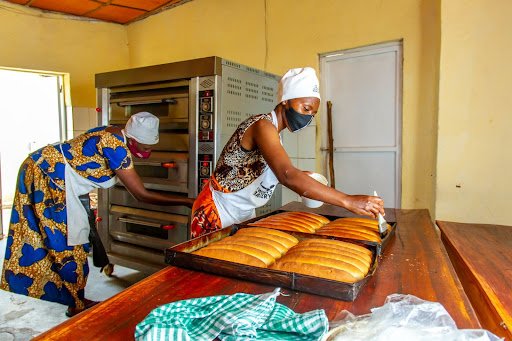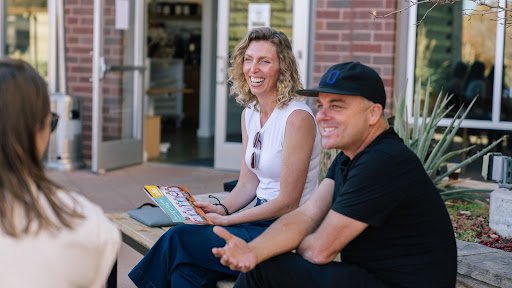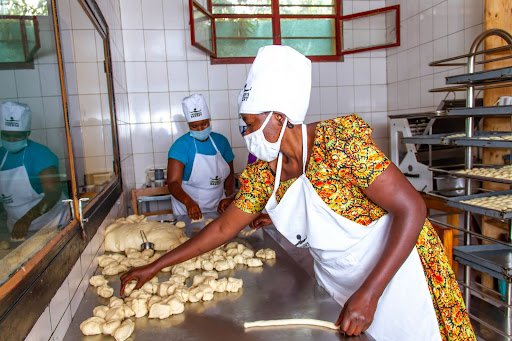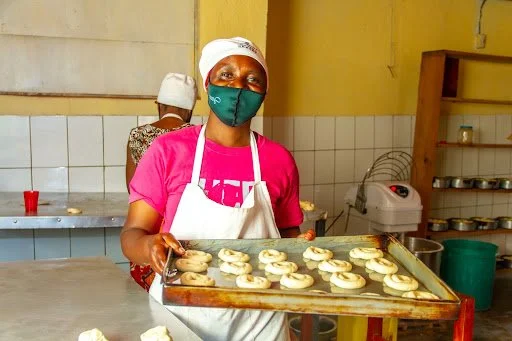Weekend Update #049
Welcome to Blue Room's Weekend Update. Each week, we're sharing what companies we're researching and the what, the who and the how that we think makes the companies interesting and unique. This roundup is brought to you weekly by a group of interns, creative minds, artists and investors who believe that through best in class investing along with the democratization of financial education we can do great things together. Enjoy, Explore and Share.This week saw several data point readings that provided a gauge of the overall economy:
The Bureau of Labor Statistics’ Core PPI rose 0.4%, coming in below the consensus estimate of 0.6%.
This number came in at 8.6% on a year-over-year basis; these levels have not been seen in over a decade
Most of the increase is attributable to supply chain challenges, materials shortages and increasing labor costs
As if to confirm the PPI numbers, the BLS’ US CPI Urban Consumers YoY index (not seasonally adjusted) came in at 6.2%, surpassing consensus estimates of 5.9%
This represents the largest annual increase since 1990
Energy, shelter, food and vehicles contributed to the price increases as businesses increase prices to offset supply shortfalls caused by the aforementioned supply chain issues and rising labor costs
US Job Openings registered at 10.4 million, below the pandemic peak of over 11 million but still at historically elevated levels and exceeds the number of unemployed in the workforce (7.4 million)
The University of Michigan’s Consumer Sentiment Index for November was 66.8, far below the consensus estimate of 72.5, and notably below the pandemic trough in April 2020 of 71.8
This index is comprised of measures of attitudes toward personal finances, general business conditions and market conditions or prices
Historically, recessions tend to ensue following declining consumer sentiment trend
In other news, two large household name companies reported they will be splitting up— Johnson & Johnson and General Electric. Electric truckmaker Rivian held its IPO, offering 153 million shares of Class A common stock at $78.00 per share and opening at $106.75, raking in nearly $12 billion in proceeds. Meanwhile, Blue Room-covered stocks held earnings calls this week, including Precision BioSciences, Coinbase, Schrödinger Inc., and Disney. Find out more in this week's Blue Room Newsletter.
Thank you Blue Room Team Leader OMAR GUZMAN.
Quickly, Liminal Space is Blue Room’s housing project targeting individuals participating in any type of workforce development.
Liminal (adj.) — of, relating to, or being an intermediate state, phase, or condition: IN-BETWEEN, TRANSITIONAL
+++
By partnering with Madelon and utilizing prefabricated modules for the 72-unit development, we are able to reduce costs and pass along the savings to tenants by way of below-market rents. This cuts the amount of hours folks have to work to even be able to afford to live, and increases their disposable incomes, which they can use to improve their quality of life in myriad ways.
+++
On Thursday, November 11, 2021, we embarked on a short 2-hour journey to Pueblo, Colorado, to visit indieDwell, a not-for-profit manufacturer of prefabricated modules that currently services affordable housing developers.
I opted to rent an SUV since I drive an EV and the lack of EV charging infrastructure along the route presented logistical challenges. In keeping with the current inflationary times, Enterprise informed me the only available vehicle was a 15-passenger van, so that’s what we went with.
The purpose of the visit was to meet the rest of the indieDwell team in person, as well as the ProSet Construction team, an industry-leading installation contractor of large-scale, multi-store modular structures, build connections, and figure out how to collaborate.
Despite the advent of remote work made possible by virtual workspaces, the in-person meeting, in my view, will never be replaced by technology.
I had personally never visited a prefabricated module factory before, so I was interested to see how the floor was configured, and maybe more importantly, get a sense of potential for economies of scale. If we are able to productize housing the way Henry Ford standardized the manufacturing of automobiles—make it easy and low-cost to dramatically increase housing stock—then we can, in effect, solve the housing crisis*, which is the end-goal of Liminal Space.
The concept of modular construction is relatively straight-forward. You build the modules in the factory and transport them to the development site, where a firm like ProSet Construction “sets” and “stitches” the modules together to complete the project. This happens in the span of weeks, whereas traditional projects can take months or even years to complete.
At indieDwell, they use an assembly line of sorts, beginning with the chassis, and later the frame, the plumbing, electrical, HVAC, insulation, drywall, interior fixtures and finally exterior finishes.
What I really liked about them is that they appear to be the ideal partner for the Liminal Space. Their mission is not only to revolutionize the building industry by producing dwellings that better occupant health and well-being, improve the health of the environment and empower community—they also live their values by going out of their way to make their workforce diverse and employing the very communities they are working to house.
Corporate Profile: Talis Biomedical Corporation operates as a molecular diagnostic company. It is developing the Talis One System to address the limitations of existing point-of-care diagnostic testing technologies for infectious diseases. The company is also developing Talis One assay kits for respiratory infections, infections related to women’s health, and sexually transmitted infections; and other tests for the detection of other respiratory infections, such as a respiratory panel test to detect influenza A and influenza B plus SARS-CoV-2. Talis Biomedical Corp was incorporated in 2013 and is headquartered in Menlo Park, California.
CLASSIFICATIONS Generally, semiconductors are silicon chips used to operate everyday electrical devices. They are called semiconductors because they exhibit properties of both insulators and conductors.
The Global Industry Classification Standard classifies semiconductors and equipment under Information Technology → Semiconductors & Semiconductor Equipment. The term, “semiconductor”, as it is colloquially referred to, is used to describe the industry in general, but in reality companies in the semiconductor space are generally one of four main types:
The Walt Disney Company, together with its subsidiaries, is a diversified worldwide entertainment company with operations in four business segments: Media Networks; Parks, Experiences and Products; Studio Entertainment; and Direct-To-Consumer & International (DTCI). The Media Networks segment includes cable and broadcast television networks, television production and distribution operations, domestic television stations, radio networks and stations. The Parks, Experiences and Products segment owns and operates The Walt Disney World Resort in Florida; the Disneyland Resort in California; Aulani, a Disney Resort & Spa in Hawaii; the Disney Vacation Club; the Disney Cruise Line; and Adventures by Disney. The Studio Entertainment segment produces and acquires live-action and animated motion pictures, direct-to-video content, musical recordings and live stage plays. This segment distributes films primarily under The Walt Disney Pictures, Pixar, Marvel, Lucasfilm and Touchstone banners. The DTCI segment operates international television and networks and direct-to-consumer streaming services. The Walt Disney Company was founded by Walter Elias Disney on October 16, 1923.
Corporate Profile:
Coinbase, Inc. was founded in 2012. The Company operates globally and is a leading provider of end-to-end financial infrastructure and technology for the cryptoeconomy. The Company offers retail users the primary financial account for the cryptoeconomy, institutions a state of the art marketplace with a deep pool of liquidity for transacting in crypto assets, and ecosystem partners technology and services that enable them to build crypto-based applications and securely accept crypto assets as payment. In May 2020, the Company became a remote-first company. Accordingly, the Company does not maintain a headquarters.
Schrödinger, Inc. Corporate Profile:
Our mission: To improve human health and quality of life by transforming the way therapeutics and materials are discovered.
Our physics-based computational platform leverages a deep understanding of physics, chemistry, and predictive modeling to accelerate innovation.
Our platform enables our collaborators to discover high-quality, novel molecules more rapidly, at lower cost, and we believe with a higher likelihood of success compared to traditional methods. We’re also harnessing this platform for our internal drug discovery programs.
We are proud to be leading this digital revolution.
Precision Biosciences Inc. Corporate Profile:
At Precision BioSciences, leaders in genome editing utilize the ARCUS editing platform to eliminate cancers, cure genetic diseases, and create safer, more productive food sources.
Genome editing technologies allow us to rethink our approach to a broad array of serious challenges faced by the world today. We now have the ability to precisely edit the DNA of a living organism, opening up the possibility of correcting genetic problems at their source.
Precision BioSciences is dedicated to improving life through its proprietary genome editing platform, “ARCUS”. Precision leverages ARCUS in the development of its product candidates, which are designed to treat human diseases in three innovative areas: allogeneic CAR T immunotherapy, in vivo gene correction, and food.
+++
THIS WEEK’S
UPDATE
— DRY STORAGE —
DRY STORAGE x
THE WOMEN’S BAKERY:
CHANGING THE WORLD ONE
SLICE OF BREAD AT A TIME
+++
With Thanksgiving rapidly approaching, we are taking a look at how food can give back to communities - both in our local Denver neighborhoods and for communities across the world.
Last Sunday, our partners at Id Est Hospitality Group and Dry Storage hosted The Women’s Bakery, a social enterprise that empowers and employs women in East Africa, creating access to quality, nutritious breads for their local community using a sustainable supply chain. Together, they hosted a bake sale, with 100% of sales from pastries inspired by The Women’s Bakery recipe directly benefiting The Women’s Bakery. Afterwards, Id Est Hospitality Group Co-owner Kelly Whitaker, The Women Bakery’s Founder & CEO Markey Culver and Director of Business Management Reba Yount held a conversation about tackling food insecurity, solving the flour crisis, and using grains to make an impact around the globe.
At Blue Room, we believe in amplifying the power of human togetherness, and we were inspired seeing these two powerhouses not only share their knowledge and learn from each other, but join forces to promote greater access to high-quality grains and the restoration of local economies.
We share some highlights from their conversation, as well as resources to learn more about and donate to The Women’s Bakery below.
Kelly Whitaker, Co-Owner of Id Est Hospitality Group, on partnering with The Women’s Bakery and tackling food insecurity:
“When I met and heard about your story, I was like, we just have to do something, we have to be a part of this. I don't care what. Because a few years ago, we started pivoting our nonprofit, Noble Grain, over to the side of food insecurity. And that's cool to say - food food insecurity is cool to talk about - but then you’re like ‘Wait, I don’t know how to solve that.’ So I was like, maybe we can learn about people on, you know, the other side of the world that are trying to tackle nutrition and food insecurity. Maybe we should hang out with them and try to build some foundation for this.
“There’s food insecurity everywhere and with Dry Storage, it's how do we support and how do we learn from the work that you guys have laid out? We understand the power of nutrition for grains, and, you know, what it does for the farmer - we’ve learned that over the last five years. As we are pivoting our nonprofit, we’re focused on this issue.”
Reba Yount, The Women’s Bakery Director of Business Management, on One Bread Project:
“One Bread Project started pre COVID, and really came out of a partnership with Abbott Fund. Really the idea was how can we partner with schools - how do we get bread not only in the hands, but the mouths of babies. Pre-COVID, we had a very small population of ones we were working with. Last year, we were ready to go - January, February, kids were getting bread, and then COVID shut everything down. And so when schools were able to reopen, we had just over 3,000 students in five different schools. This year, we’ve continued to partner with Abbott as well as lots of other folks in the banking industry, and we know have eight different schools and 7,000+ kids receiving bread every day.I will say one of our largest partnerships is not only between folks in the US, but also within Rwanda because it’s all three bakeries providing local primary schools.”
On working to solve the flour crisis together:
Kelly Whitaker: “Where we’re meeting in the middle is trying to solve the flour crisis, the monopoly of flour that’s happening in Africa. There’s really only one supplier of flour, some of you know, so that’s where our work kind of begins.
“The idea is that as chefs as a collective - hospitality, restaurateurs, or whatever - we can pool together our resources and our voices and say, ‘Hey, we need to really take a look at this issue.’
And that's where I think our work begins”
Markey Culver: “We crunched the number, and wheat flour increased 58% in price, I think, for us in Rwanda. It’s been very high, and there's only one dude.
“The long term vision is to be able to grow wheat in Rwanda, and a mill. We found two places in Rwanda that grow wheat. Rwanda is probably a sixth of the size of Colorado, but most of the country is at the elevation of Denver. There are some places where it's about 7,000 feet, some places where it's about 3,000 feet, but it's really wet. You're in like the rain forest. So will we even grow in a place like that? But that’s the ultimate, long term vision to be able to grow our own wheat, mill that wheat, supply all of our bakeries, and if we have excess then sell that excess, which I think is really similar to why you guys started this.
Kelly Whitaker: “With our restaurant group, as I said to you, we're trying to stay very small and focused. But on the other side, the wheat needs to be a bigger solve for a lot of other things. So it's like, how do we grow that? And how do we, you know, touch with that community? We were just in Guadalajara last week, and we already have this whole idea of setting up like a molino down there. They’re like, we want the flour, and I was like, it might be a little tricky, but you guys have a lot of corn, you grow a lot of this, like, what else do you do? Like, can we set up a hub that makes a lot more sense for Guadalajara in that area? That’s like the 5 or 10 year vision. We can obviously mill grains sooner than that, and it could be that we have to if flour is controlled like this.“We grow on I think more acres than anyone in Colorado - 200 acres, and we now have another 150 acres throughout Longmont. For us, it all comes back to the value of human life, and how to solve some of these bigger questions. We're resetting the value of wheat, and all that is based on what does the farmer make? And how do we pull that into what we're doing?
“Bread is a good foundation, but we're really trying to show range with the impact of what this could be for the world.”
Markey Culver: “I'm inspired by what Kelly is doing, because I think we can learn. And hopefully if it's already growing in certain places in Rwanda, that means that we could propagate it elsewhere, potentially.”
MEET MARKEY CULVER
Markey Culver is the founder and Co-Director of The Women’s Baker. She believes that bread can be a vehicle for improving children’s nutrition and a medium for social and economic empowerment for women.
+++
BLUE ROOM
///
Friday
November 11, 2021
9:30 AM
__________ _________
BLUE ROOM
Investment Team Bullpen
__________ __________
I
N
Q
U
I
R
E
10% OF ALL BLUE ROOM REVENUES GO DIRECTLY TO FUND OUR NON PROFIT TOGETHERISM.
WE CAN ACCOMPLISH ANYTHING TOGETHER.





